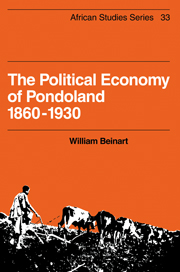Book contents
- Frontmatter
- Contents
- List of maps
- Preface
- Abbreviations
- Introduction
- 1 The political economy of Pondoland in the nineteenth century
- 2 Crops, cattle and the origins of labour migrancy, 1894–1911
- 3 Rural production and the South African state, 1911–1930
- 4 Chiefs and headmen in Pondoland, 1905–1930
- 5 Rural differentiation, alliance and conflict, 1910–1930
- Postscript
- Tables
- Notes
- Select bibliography
- Index
- BOOKS IN THIS SERIES
4 - Chiefs and headmen in Pondoland, 1905–1930
Published online by Cambridge University Press: 26 February 2010
- Frontmatter
- Contents
- List of maps
- Preface
- Abbreviations
- Introduction
- 1 The political economy of Pondoland in the nineteenth century
- 2 Crops, cattle and the origins of labour migrancy, 1894–1911
- 3 Rural production and the South African state, 1911–1930
- 4 Chiefs and headmen in Pondoland, 1905–1930
- 5 Rural differentiation, alliance and conflict, 1910–1930
- Postscript
- Tables
- Notes
- Select bibliography
- Index
- BOOKS IN THIS SERIES
Summary
The dipping crisis and the new paramountcy
Rather than destroy the chiefs in the Transkeian Territories, except for those who had openly rebelled against the Colony, the administration sought to deprive them of many of their independent powers, make them dependent on the state, and use their remaining authority to ease the implementation of colonial rule. Bokleni in Western Pondoland, and especially Dalindyebo in Thembuland, were held up, in contrastto Sigcau, as models of the Colonial chief. After Sigcau's death in 1905, however, the administration attempted to mould his successors to accept their role in the Colonial state. Sigcau's heir, Marelane, was about fifteen years of age when his father died. As he was considered too young to succeed, Mhlanga, son of Mqikela's first wife, was appointed regent by the chiefs and people with the approval of the administration. Sigcau had intended to send Marelane to the United States to further his education; at the turn of the century the paramount had developed some links with Ethiopian churches in the Territories which were organising such educational trips for Transkeian youths. But Colonial officials, intent on making not only an educated and progressive, but also a co-operative, chief out of Marelane, were wary of ‘American’ ideas which they felt were espoused by the separatist church movement. They advised Mhlanga to keep him in South Africa, and in 1907 Marelane went to Lovedale, the leading Eastern Cape mission school. The principal attempted to instil Christian and colonial ideas into him and even hesitated to allow him home for holidays lest he slip back into Mpondo politics and Mpondo values.
- Type
- Chapter
- Information
- The Political Economy of Pondoland 1860–1930 , pp. 104 - 130Publisher: Cambridge University PressPrint publication year: 1982

